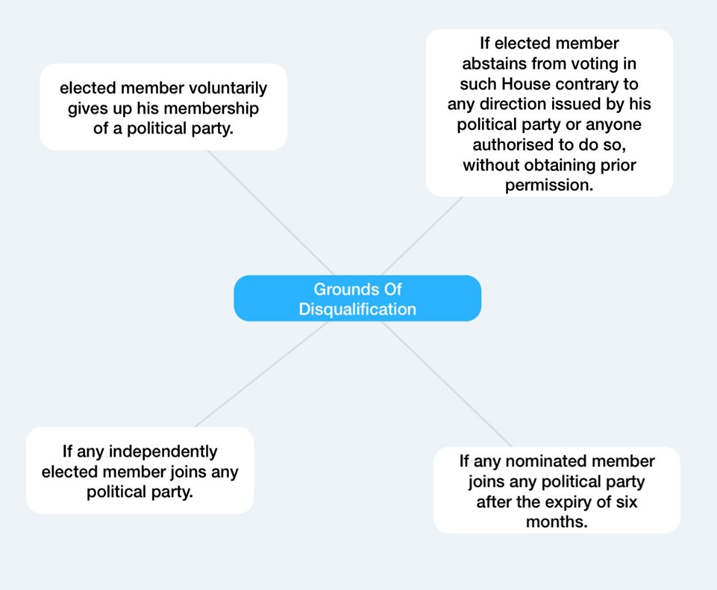THE LONG ROAD TO REFORMING INDIA’S POLITICAL PARTY SYSTEM
Relevance: GS 2 – Pressure groups and formal/informal associations and their role in the Polity.
Why in the News?
- In light of recent political events, doubts arise regarding the perceived necessity and effectiveness of India’s anti-defection law.
- The approach of the 2024 general election brings attention to a notable increase in political defections across the nation.
- The prevalence of political defections prompts reevaluation of the relevance and utility of India’s anti-defection legislation.
Defections and Disqualifications
- In Bihar, MLAs from Congress and Rashtriya Janata Dal (RJD) have joined the Bharatiya Janata Party (BJP), while cross-voting in favor of BJP occurred during recent Rajya Sabha elections in Himachal Pradesh.
- Consequently, the concerned MLAs have been disqualified under India’s anti-defection law, with similar disqualifications occurring in the Andhra Pradesh Assembly.
Adjudicatory Development in Maharashtra
- An adjudicatory event that took place over a fortnight ago on February 15, 2024, casts doubt on the perceived necessity and effectiveness of India’s anti-defection law.
- The Maharashtra Legislative Assembly Speaker issued a verdict regarding the 2023 split within the Nationalist Congress Party (NCP), wherein no MLA from either faction was disqualified.
- The ruling recognized the Ajit Pawar faction as the “real” NCP, resembling previous decisions such as the split in the Shiv Sena, where neither faction was disqualified, and one faction (in that instance, the Eknath Shinde faction) was acknowledged as the legitimate entity.
- Speaker’s Rationale and Observations
- The Speaker’s reasoning behind the verdict can be inferred from the livestreaming of the Assembly proceedings, as official copies of the decisions are unavailable.
- Relying on the test of legislative majority, the Speaker determined that the Ajit Pawar-led faction of the NCP had the support of 41 out of 53 NCP MLAs, establishing it as the authentic NCP.
Interpretation of Intra-Party Dissent
- The period between June 30 and July 2, 2023, during which the NCP experienced a vertical split, is characterized as an expression of “intra-party dissent.”
- The Speaker concluded that such dissent within a party cannot be subject to the punitive provisions of the Tenth Schedule, thereby preventing disqualification of dissenting MLAs from the Assembly.
Critique of Speaker’s Observation
- The soundness of the Speaker’s observation can be challenged, particularly regarding the applicability of the anti-defection law to these proceedings.
- While dissenting groups within a political party might seek to distance themselves, they ideally should merge with another party to claim protection under the Tenth Schedule.
- Under the anti-defection law, factions splitting from their original party cannot claim exemption from disqualification independently, as the “split” exception was removed from the Tenth Schedule in 2003.
Exemption and Mergers
- The only exemption available to legislators moving in groups is through mergers, requiring a minimum of two-thirds of members to separate from their party and merge with another.
- However, in both the Shiv Sena and NCP splits, the factions led by Eknath Shinde and Ajit Pawar, respectively, did not choose to merge with an existing party or establish a new one within the strict terms of the Tenth Schedule.
- Instead, each faction claimed to be the original party and formed alternate governments with other political parties.
Questioning the Purpose of the Anti-Defection Law
- The Speaker’s observation raises concerns about the effectiveness and purpose of the anti-defection law enshrined in the Constitution.
- Despite clear violations of the law, the adjudicating authority seems to allow such transgressions to go unchecked.
- Legal Interpretation
- Rather than engaging with the legal language of the anti-defection law, the Speaker’s approach focused on broader political dynamics.
- The Speaker expressed a worrying view that political maneuvers such as forging new alliances and breaking old ones are inherent to politics and should not be considered defections under the Tenth Schedule.
- Preservation of Inner-Party Dissent
- The Speaker’s concern for safeguarding inner-party dissent is commendable, as he argues that the Tenth Schedule should not be used to stifle dissent within political parties.
- The Speaker had to rely on the legislative strength of each faction to determine the authentic NCP due to a lack of reliable information within the party’s constitution, leadership, and organizational structure.
- Reforming the Political Party System
- The prevalence of defections underscores the urgent need for comprehensive reform of the political party system, with a focus on fostering greater democracy within parties.
- Defections often stem from a lack of inner-party democracy within the original political party of a legislator who switches sides.
Proposed Reforms and Recommendations:
- A thorough study is required to assess the strength of democratic structures and processes within political parties.
- Statutory regulations should be introduced to compel political parties to ensure greater inner democracy, as proposed by the 255th Report of the Law Commission of India.
- Law Commission’s Recommendations:
- The recommendations include amendments to the Representation of the People Act, 1951, mandating political parties to elect an executive committee, select candidates for elections, and conduct regular internal elections at every level.
- The Election Commission of India would be granted powers to impose penalties or withdraw registration of parties failing to comply with these regulations.
Delayed Implementation and Consequences:
- Despite the Law Commission’s recommendations, no action has been taken, leading to continued deficiencies in ensuring inner-party democracy.
- The absence of robust mechanisms to promote inner-party democracy has resulted in the circumvention of the Tenth Schedule in high-profile cases such as those involving the Shiv Sena and NCP.
Opportunity for Reform:
- The Maharashtra Legislative Assembly Speakere. Rahul Narwekar is leading a committee to review the anti-defection law, presenting an opportune moment for India to enact reforms tailored to its needs and realities.
Mains question
Discuss the significance of inner-party democracy in mitigating political defections. Propose reforms to strengthen India’s anti-defection law. (250 words)




